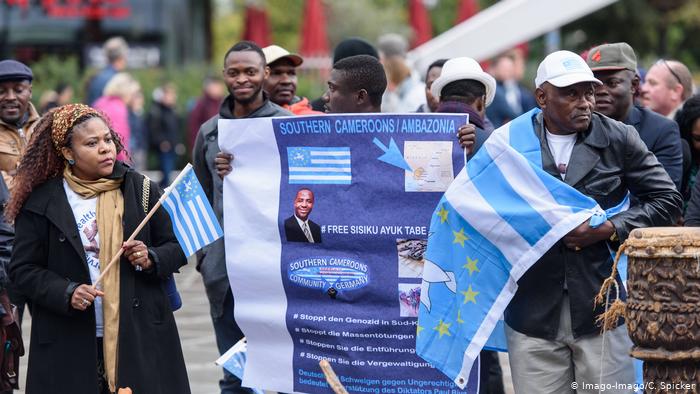Survey of Southern Cameroonians Reveal Overwhelming Support for Full Independence
The Coalition for Dialogue and Negotiations conducted a survey of Southern Cameroonians from October 16 – 24 to gauge their aspirations on key aspects of their homeland. This survey that drew three thousand seven hundred and forty-nine (3,749) respondents is probably the largest survey of its kind of Southern Cameroonians. 1A similar survey conducted by Cardinal Tumi last year had over 1,000 respondents. Despite the ongoing war, the largest share of survey respondents (38%) was from Cameroon. The remaining respondents were from the United States (23%), United Kingdom (7%), Nigeria (6%), Germany (4%), Canada (3%), South Africa (3%), United Arab Emirates (3%) and other countries.
The results suggest a strong preference for greater autonomy among Southern Cameroonians. Eighty six percent (86%) of respondents chose full independence as the best form of state to address root cause of conflict. Seven percent (7%) chose federation and four percent (4%) selected confederation. Only one percent (1%) chose Government-sponsored “Special status”.
Eighty percent (80%) of respondents preferred a UN-mandated body as best mediator of the armed conflict. Nine percent (9%) chose the Swiss-led process. Only one percent (1%) of respondents thinks the Government of Cameroon should mediate.
On the legal system, the vast majority (87%) of respondents prefer an independent judicial system based on common law. Another ten percent (10%) chose common law system controlled by central government.
While Anglo-Saxon Educational system was favorable (57%), many Southern Cameroonians would like to see a newly developed educational system (38%). It is worth noting that the latest wave of the Anglophone crisis was sparked by protests by Lawyers and Teachers in 2016. Lawyers protested against the erosion of the common law in the two English-speaking regions, while Teachers protested against the dilution of the Anglo-Saxon educational system in the same regions.
Most Southern Cameroonians would like to see their Elder Statesmen and women play a more active advisory role to end the armed conflict. Most respondents also prefer their traditional leaders to serve only as custodians of culture and traditions. A sizeable minority are happy for their traditional leaders (chiefs and fons) to play a more active role in local administration, so long as they are exempted from political parties.
On the economy, an overwhelming majority of Southern Cameroonians (95%) rejected the CFA franc as their currency. On matter of security most respondents (96%) do not approve of Gendarmes as their law enforcement officers. Eighty percent (80%) of them preferred locally instead of centrally controlled police forces.
It is worth noting that these trends are steady across different segments of the population including gender, age groups, and level of education. There was no major difference in results even after adjusting for gender imbalance.
Deeper statistical analysis also showed that the choice of form of state was highly correlated with citizen’s preferences for their ideal system of law and order, economy, and education. Those who prefer an independent judiciary system, reject the Franc CFA, prefer an Anglo-Saxon educational system, or reject the Gendarmes, also tend to prefer full independence.
These compelling results confirm three things about the ongoing armed conflict: First, negotiations are inevitable to end the war. Second, independence must be part of any negotiations. It cannot be excluded given its strong appeal among Southern Cameroonians. Finally, to resolve this conflict there must be a truly inclusive dialogue involving the full spectrum of Southern Cameroonian opinion. Cosmetic policies that do not address the root cause(s) and true aspirations of Southern Cameroonians will inevitably fail as we have seen with the recent Grand National Dialogue and evidently the special status proposed as a solution to the armed conflict.
We thank 4Most, a Credit Risk and Analytics Consultancy Firm in London, United Kingdom, for analyzing the data and for presenting their findings.
About the Coalition for Dialogue and Negotiations
The Coalition for Dialogue and Negotiations (CDN) is an international non-governmental organization (NGO) with the specific goal of facilitating dialogue and negotiations towards ending the war in Southern Cameroons. CDN is made of professionals from all works of life and over 20 partner organizations worldwide advocating for an end to the war. CDN members work with its partners to strengthen international involvement in resolving the conflict and building durable peace in the conflict affected territories.





